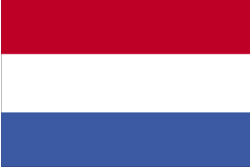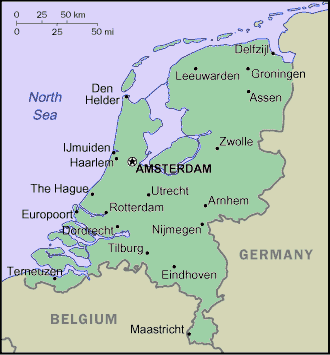Traveling Luck for Netherlands. Netherlands, Europe
Netherlands is located in Western Europe, bordering the North Sea, between Belgium and Germany.
Land in Netherlands is mostly coastal lowland and reclaimed land (polders); some hills in southeast.
Dutch land covers an area of 41526 square kilometers which is slightly less than twice the size of New Jersey
Netherlands has borders with Belgium for 450km and Germany for 577km.
 Dutch national flag (Flag of Netherlands)
Dutch national flag (Flag of Netherlands)
As for the Dutch climate; temperate; marine; cool summers and mild winters.
Dutchman(men), Dutchwoman(women) speak Dutch (official), Frisian (official).
Places of note in Netherlands
- Amsterdam
- vlaardingen
- The Hague
- Utrecht
- Eindhoven
- Tilburg
- Groningen
- Almere-Stad
- Breda
- Nijmegen
- Apeldoorn
- Enschede
- Haarlem
- Arnhem
- Zaanstad
- 's-Hertogenbosch
- Amersfoort
- Hoofddorp
- Maastricht
- Leiden
- Dordrecht
- Zoetermeer
- Zwolle
- Emmen
- Ede
- Born
- Delft
- Alkmaar
- Heerlen
- Venlo
- Leeuwarden
- Amstelveen
- Roosendaal
- Purmerend
- Oss
 Dutch map
Dutch map
Regions of Netherlands
The Kingdom of the Netherlands was formed in 1815. In 1830 Belgium seceded and formed a separate kingdom. The Netherlands remained neutral in World War I, but suffered invasion and occupation by Germany in World War II. A modern, industrialized nation, the Netherlands is also a large exporter of agricultural products. The country was a founding member of NATO and the EEC (now the EU), and participated in the introduction of the euro in 1999.
The Netherlands has a prosperous and open economy, which depends heavily on foreign trade. The economy is noted for stable industrial relations, moderate unemployment and inflation, a sizable current account surplus, and an important role as a European transportation hub. Industrial activity is predominantly in food processing, chemicals, petroleum refining, and electrical machinery. A highly mechanized agricultural sector employs no more than 2% of the labor force but provides large surpluses for the food-processing industry and for exports. The Netherlands, along with 11 of its EU partners, began circulating the euro currency on 1 January 2002. The country continues to be one of the leading European nations for attracting foreign direct investment. Economic growth slowed considerably in 2001-05, as part of the global economic slowdown, but for the four years before that, annual growth averaged nearly 4%, well above the EU average.
Dutch natural resources include natural gas, petroleum, peat, limestone, salt, sand and gravel, arable land
located at mouths of three major European rivers (Rhine, Maas or Meuse, and Schelde)
Dutch religion is Roman Catholic 31%, Dutch Reformed 13%, Calvinist 7%, Muslim 5.5%, other 2.5%, none 41% (2002).
Natural hazards in Netherlands include flooding.
Travel Advice for Netherlands
NetherlandsSUMMARY
- The Netherlands shares with the rest of Europe a threat from terrorism. Attacks could be indiscriminate and against civilian targets.
- The Dutch Government introduced compulsory identification in January 2005. Everybody over the age of 14 is required to show a valid identity document to police officers and other law enforcement authorities on their request (please see the Local Laws and Customs section of this Travel Advice for more details).
- Around 2 million British tourists visit the Netherlands every year. Most visits are trouble-free. The main type of incident for which British nationals require consular assistance in the Netherlands is for replacing stolen passports, which occur mainly (although not exclusively) on trains, trams and in restaurants. You should also be alert to the dangers of street crime in the cities.
- We strongly recommend that you obtain comprehensive travel and medical insurance before travelling. You should check any exclusions, and that your policy covers you for the activities you want to undertake. Please see: Travel Insurance.
SAFETY AND SECURITY
Amsterdam Police are warning travellers of an increasing trend whereby men –usually originating from Eastern European countries – make themselves out to be plain clothed policemen. The trend is that one man usually addresses people to find out if they are tourists. When confirmed, two fake policemen (in plain clothes) show false police identities and pretend to be investigating counterfeit money and false credit cards. People are asked to hand over their money and credit cards for verification – sometimes they also ask for PIN numbers. Often people are searched for drugs. After the ‘inspection’ the fake policemen return all the money and cards – at least that is how it seems. Victims usually find later on that part of the money and/or credit cards are gone.
Fake policemen never wear a uniform and like to show shiny police badges. Dutch policemen don’t have badges. Also, Dutch police in plain clothes will rarely carry out this type of inspection. Always ask for identity, check it thoroughly and don’t let yourself be intimidated. Call 0900-8844 to get in touch with the nearest police station if you are not entirely happy.
Although there is no direct evidence to show the practice is being carried out in the Netherlands, there is an increasing trend throughout Europe (particularly Eastern Europe) of drinks being spiked. Always be aware of your drink and don’t leave it unattended. If you believe you have been the victim of a spiked drink seek medical help immediately and if possible, inform the police.
LOCAL LAWS AND CUSTOMS
- If you are living in or visiting the Netherlands and are a national of the European Union (or the European Economic Area) you can use your passport or EU/Eer-vreemdelingendocument.
- If you are a dual national you can identify yourself with a valid Dutch driver’s licence, passport or Dutch/European identity card.
- Photocopies are accepted as a temporary measure but police may insist on seeing the original document as well.
ENTRY REQUIREMENTS
HEALTH
GENERAL
EU Aviation Regulations

 Search
Search Netherlands country profile
Netherlands country profile Travel advice for Netherlands
Travel advice for Netherlands